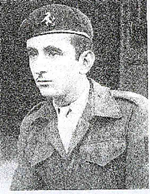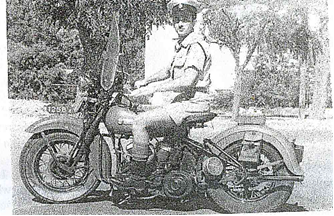
My experience in the Belgian underground during the occupation by the Germans helped me to survive and taught me how to be proficient in using all manner of weaponry for offensive and defensive purposes.
Early memories go back to a happy childhood with a normal family life in Charleroi, a small mining town in southern Belgium near the French border, where I was born. Around age 13, my family moved to the large city of Brussels where I attended school and my education was interrupted by the German occupation in 1940. To defend our country against the intruders, my father and I joined the local underground organization of volunteers. This unit had no name, but later we found out that the leaders were running our group from England. Some of our instructors were English and taught us how to sabotage and destroy the enemy which, in later years, would turn out to be very helpful.
When our section of Belgium was liberated by the British 6th Army in early 1945, I volunteered with the younger lads of our unit and was sent to England to train to become the first Belgian SAS (Special Air Service). After several parachute jumps, we became active behind the German lines and saw action until the end of the war. After the war the SAS unit became known as the King’s Elite Troop.
While I was still serving in the Belgian Army, I read a flyer requesting volunteers to join the United Nations Organization in what was then Palestine. After signing up, I was given an appointment to be interviewed by an English general in London. I passed all the qualifications, but was rejected because, as they told me, I was of the Jewish faith. Upon my return to Belgium, and being very upset, I resigned from the Belgian Army.
However, towards the end of 1947, I was successful in joining a Haganah unit in Belgium, whose function was to move displaced persons and survivors from Eastern Europe to Southern France in the hope that they could eventually escape to Palestine. My first assignment was to smuggle over fifty D.P.s from Brussels to Marseilles, France. The camp near Marseilles, called Grandes Arénas, was overcrowded with refugees liberated from Hitler’s death camps from all over Europe. While there, I was asked to help train some of the young men in the art of weaponry, which later proved to be a blessing for the Israeli military. I must admit that the French Army and police were, at that time, very friendly towards the Jews, and even provided us with some small arms for our training. Thanks to them, we were allowed to function as a training unit.
I continued in this work until I received orders to join a group that was flying to Palestine. This was in the early part of 1948 at the beginning of the confrontation with the attacking Arab armies. Our plane landed safely on an abandoned air strip which the British had just evacuated, somewhere in the north of Palestine. Eventually I became attached to the 72nd Battalion of the 7th Brigade, which was an “Anglo-Saxon” unit. I served with this unit until I was assigned to the French Commando Company of the Palmach. Eventually, I became an instructor in the first paratroop unit stationed near Haifa and commanded by Yoel Palgi.
Since entering the ranks of the Haganah, my family back home had not a clue as to what had happened to me. They were relieved when I showed up unexpectedly after being slightly wounded in combat while serving in the Israeli Army. I had come back home to recuperate for a short time. As soon as I was able, I was on my way back to Israel and rejoined my unit once more.
When peace came, I joined the Israel Police Force.

While stationed in Netanya I met my future wife Shirley. We married in Belgium and took up residence in the U.S.A., where Shirley was a citizen.
Author: Jules Kraut, Machal West (USA) Newsletter: Summer 2006

